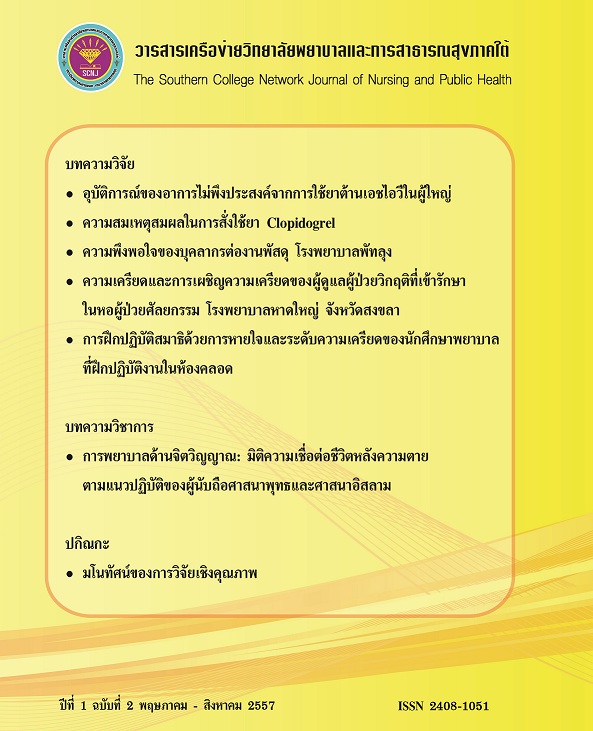การพยาบาลด้านจิตวิญญาณ: มิติความเชื่อต่อชีวิตหลังความตายแนวปฏิบัติของผู้นับถือศาสนาพุทธ และศาสนาอิสลาม
คำสำคัญ:
การพยาบาลด้านจิตวิญญาณ, ความเชื่อ, ชีวิตหลังความตาย, Spiritual Health, Nursing Care, Belief in Life after Deathบทคัดย่อ
บทความเรื่อง การพยาบาลด้านจิตวิญญาณ: มิติความเชื่อต่อชีวิตหลังความตาย มีวัตถุประสงค์เพื่อถ่ายทอดความรู้และประสบการณ์ของผู้นิพนธ์ ในการพยาบาลผู้ป่วยเพื่อตอบสนองความเชื่อต่อชีวิตหลังความตาย บริบทโรงพยาบาลชุมชนและโรงพยาบาลทั่วไปในภาคใต้ตอนล่าง ตามแนวทางปฏิบัติของผู้ที่นับถือศาสนาพุทธและศาสนาอิสลาม ดังนี้ ผู้ที่นับถือศาสนาพุทธ ได้แก่ 1) สวดมนต์บทพุทธคุณหรือให้ระลึกถึงคุณความดี 2) ตกแต่งศพให้สะอาดและเก็บส่วนอวัยวะให้ครบถ้วน 3) กล่าวคำอโหสิกรรม 4) หยอดน้ำทางปาก 3 ครั้ง 5) พนมมือถือดอกบัวบูชา 6) กรวดน้ำอุทิศส่วนกุศล 7) บอกหรือเชิญให้ผู้เสียชีวิตกลับ และผู้ที่นับถือศาสนาอิสลาม ได้แก่ 1) การระลึกถึงพระเจ้าในทางที่ดี 2) การจัดท่าให้ผู้ป่วยนอนตะแคงทับสีข้างด้านขวา (หากทำไม่ได้ให้จัดท่านอนหงาย) หันใบหน้าไปทางทิศกิบลัต 3) การกล่าวบทสวดหรือการปฏิญาณตน 4) การปฏิบัติต่อเสียชีวิตมุสลิมเสมือนยังมีชีวิต และ 5) การจัดการน้ำศพกลับไปประกอบพิธีทางศาสนา
การศึกษาทางการพยาบาลควรพัฒนาอาจารย์ให้มีความรู้ ความเข้าใจในความหลากหลายทางวัฒนธรรม จัดกิจกรรมส่งเสริมให้นักศึกษามีการแลกเปลี่ยนวัฒนธรรม เพื่อนำไปสู่การจัดการเรียนการสอนที่สอดคล้องตามหลักศาสนาอย่างแท้จริง
Adapting the Nursing Practice into the Belief in Life after Death of Buddhists and Muslims: A Matter of Spiritual Health
This article presents about the nursing care of patient’s spiritual health, it is to say taking in account the metaphysical belief into a form or another of life after death. The objective of this article was to transfer knowledge and know-how of the author in providing nursing care for patients. The study has been conducted in the context of community hospitals and general hospitals where both practices of Buddhism and Islam religions (most of Muslim believers live in the lower Southern Thailand). The cares provided by the Nurse towards the Buddhist patients were as following: 1) chanting in order to inspire gratitude and good memories about life; 2) taking good care of the corpse after patient passed away; 3) listening to the dying patient when he/she was asking for forgiveness; 4) dripping some drinking water to patient three times a day; 5) offering lotus flowers; 6) pouring dedicate the merit of charity; 7) telling gently to the family of a deceased person when it is time to go back home.
The cares provided by the Nurse towards the Muslim patients were as following: 1) paying gratitude to God with the patient when death throes; 2) placing the patient in supine position and turn his/her face towards the Qiblah (the direction that should be faced when a Muslim prays during death throes); 3) pronouncing the ritualistic prayer or vows; 4) treating the dead corpse of Muslims as they are still alive, and; 5) organizing the transportation of the Muslim Corpse back home for a religious ceremony. In nursing education, it is important to develop the knowledge of nurse instructors about religious and cultural diversity. Cultural exchange activities should be promoted among nursing students. And the teaching of cultural awareness for appropriate nursing care should also be provided.
ดาวน์โหลด
เผยแพร่แล้ว
ฉบับ
ประเภทบทความ
สัญญาอนุญาต
1. บทความหรือข้อคิดเห็นใด ๆ ที่ปรากฏในวารสารเครือข่าย วิทยาลัยพยาบาลและการสาธารณสุขภาคใต้ ที่เป็นวรรณกรรมของผู้เขียน บรรณาธิการหรือเครือข่ายวิทยาลัยพยาบาลและวิทยาลัยการสาธารณสุขภาคใต้ ไม่จำเป็นต้องเห็นด้วย
2. บทความที่ได้รับการตีพิมพ์ถือเป็นลิขสิทธิ์ของ วารสารเครือข่ายวิทยาลัยพยาบาลและการสาธารณสุขภาคใต้








